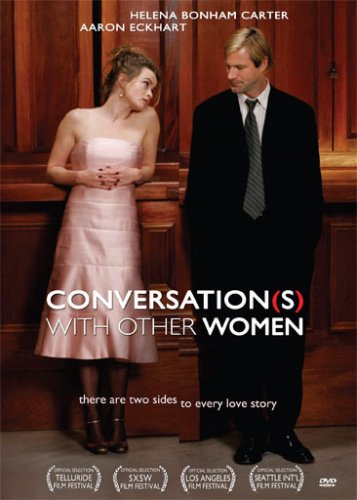**½/**** Image A- Sound A Extras B
starring Aaron Eckhart, Helena Bonham Carter, Nora Zehetner, Eric Eidem
screenplay by Gabrielle Zevin
directed by Hans Canosa
by Travis Mackenzie Hoover There's no real arguing with Conversations with Other Women–you either buy into its common program of relationship angst and mid-life crisis or you don't. Although director Hans Canosa tries to juice things up with a split-screen technique that's less unctuous than the description might suggest, it's still the same Woody Allen-ish trip through romantic failure via witty banter. There's an extent to which this can be entirely watchable, and at no point does the film grind to a halt and become a chore to sit through. Its concept is a tad far-fetched, however, and the insights gleaned from the chance encounter of two people at a wedding reception are nothing you can't find in the pages of any major glossy mag.
Aaron Eckhart and Helena Bonham Carter play those two nameless people, both in their late-thirties and facing the void. The former approaches the latter at a wedding reception and strikes up a conversation. He's flirtatious; she's standoffish. He's divorced but dating a 23-year-old; she's divorced and remarried to a doctor. He's the brother of the bride; she's the last-minute replacement for a fallen bridesmaid. And so the man tries to put the moves on the woman and she puts up defenses–though he somehow manages to talk his way into her room despite her apparent ability to see right through him. The split-screen effect that separates them in the frame also reveals their past history together–a past of which the woman doesn't appear entirely cognizant.
A big problem with this setup is that one has to swallow the idea that two people who had a long-term relationship would be at some point unrecognizable to one another–or, at least, that one would fail to be recognized by the other. Wisely, the script by Gabrielle Zevin makes this flaw a part of its ultimate design, and it sketches the psychology of the pair with a fair amount of accuracy. (Zevin is aided by Canosa's bisected frame and its ability to partition not just space but time as well.) For their parts, Eckhart and Carter commit totally to the script, their performances seamless and entirely credible. The only thing left is to give us a compelling reason to care–and as well-executed as the film is, it's not entirely successful in delivering those particular goods.
One registers the approaching-mid-life dissatisfaction of these characters without actually feeling it. The leads' problems are more badges of honour than points of inquiry–they're sources of "conflict" and "drama" as opposed to actual interrogations into the feelings of a certain age bracket. One watches willingly but uninvolved; we nod at the allusions to emotion without being genuinely absorbed or enlightened. Mostly, Conversations with Other Women is about midlife crises split into both genders, and while that may provide some comfort, it doesn't really draw any straight conclusions. There's no massive and gaping flaw in the design of the movie, it's just that it builds on well-trod ground and never reaches very high.
THE DVDSony/TVA's Canadian import DVD is generally quite good. The 2.35:1, 16×9-enhanced image is a skilled HD downconversion; detail is less than crystalline, but colours are vibrant without bleedthrough and it often looks indistinguishable from 35mm. The Dolby Digital 5.1 audio is sharp and clear–the film has a sparkling mix considering there's almost no need for the surround channels save for music cues.
Extras begin with "Why Split Screen?" (4 mins.), in which director Canosa explains his rationale behind the use of…guess what? He's reasonably lucid in divulging his techniques, if a tad more impressed with them than he ought to be. An EPK featurette (4 mins.) is less interesting, the usual everybody-was-wonderful blather that tends to define the form. Next come interviews: Carter (9 mins.) is refreshingly blunt and unpretentious in recounting her love of the script and eventual winning-over to what she feared would have been a "gimmick" while Eckhart (7 mins.) enthuses about his co-star and kvells about the script. An enthusiastic Canosa (27 mins.), meanwhile, elaborates on his process, but he ironically reveals the conventionality of his thinking in asserting his unconventionality and comes off as slightly deluded in the process. Finally, executive producer/FX supervisor Kwesi Collisson (3 mins.) provides basic info on the extensive prep that had to be done as well as the slight digital tweaks that were inserted after-the-fact. A remark on Star Wars vs. this "simple story" will have you rolling your eyes.
"Tell Your Story: Telluride Film Festival 2005" (14 mins.) sees Canosa and Collisson standing in the Telluride street explaining themselves: after a tantalizing anecdote about a dream of Canosa's following his first film (at 17!), the conversation drifts towards the technical specs involved in realizing Conversations with Other Women and how new software and technology have "democratized" filmmaking. It's a decent clip yet still hampered by both parties' pretentiousness. The "director's demo" (4 mins.) features a demo reel that explained to investors the project and how it was to be executed; its combination of storyboards and footage is a good lesson to anyone trying to get a movie off the ground. A "Selected Scene" (2 mins.) resurrects the awkward elevator ride for reasons that are entirely obscure to me, while the film's international trailer rounds things out.
85 minutes; R; 2.35:1 (16×9-enhanced); English DD 5.1, English DD 2.0 (Stereo); CC; DVD-9; Region One; TVA/Sony




![Toy Story (1995) [Special Edition] + Toy Story 2 (1999) [Special Edition] - Blu-ray + DVD FFC Must-Own](https://i0.wp.com/filmfreakcentral.net/wp-content/uploads/2024/03/6a0168ea36d6b2970c016304cd768d970d-600wi.gif?resize=100%2C91&ssl=1)

